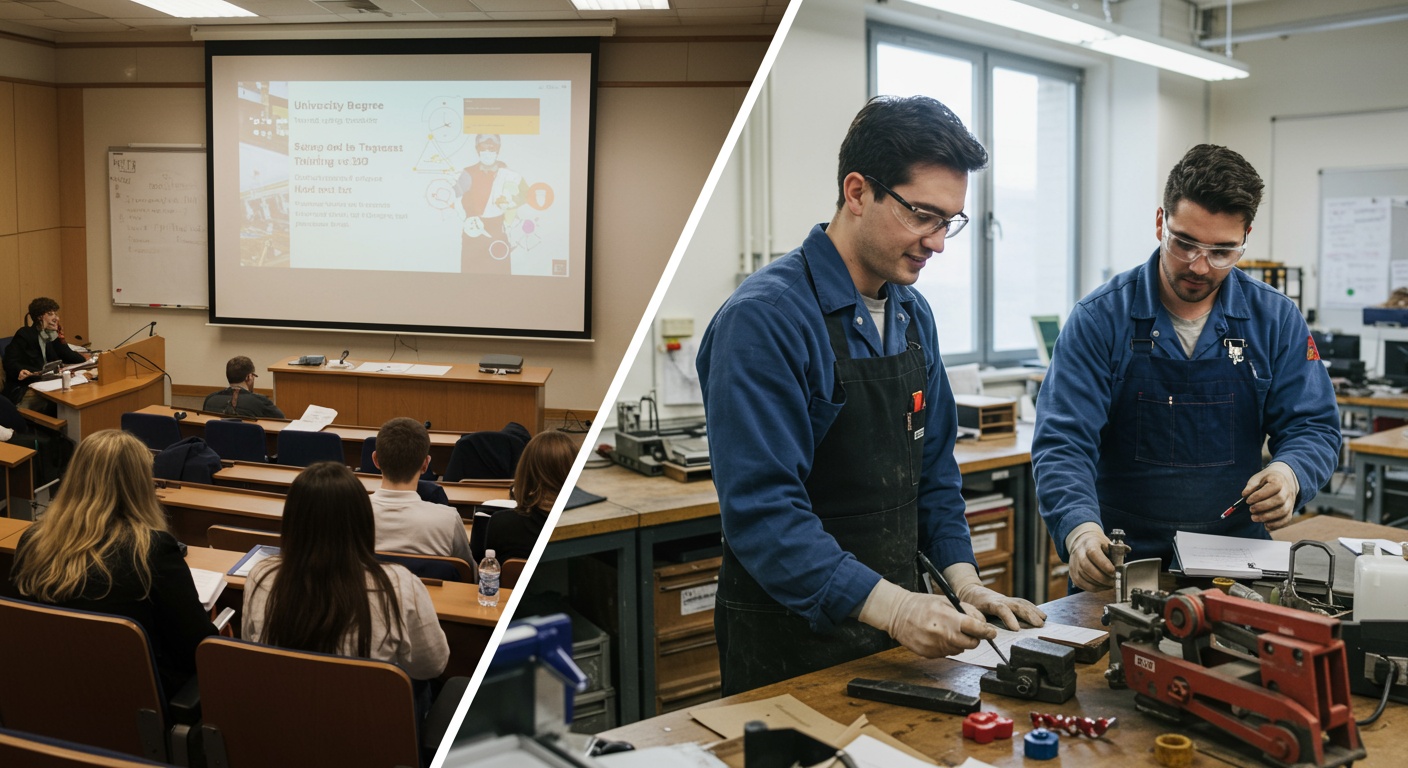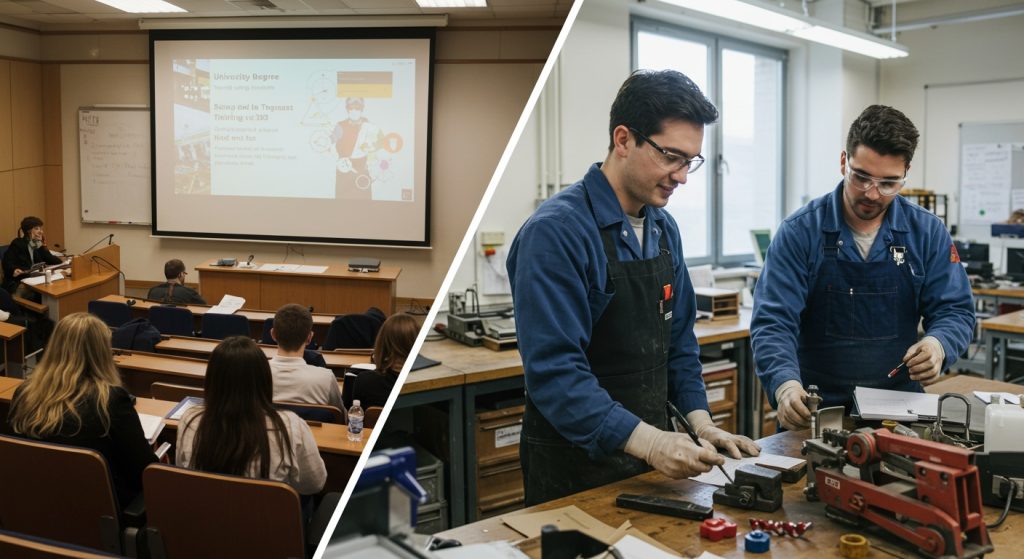The skills gap is widening. The question of how best to prepare for the future workforce is more pressing than ever. While a computer science degree might seem like the obvious choice for a career in tech, intensive coding bootcamps are rapidly gaining traction, promising faster entry into the field. Similarly, the demand for skilled tradespeople like electricians and plumbers continues to rise, often exceeding the supply. But is a four-year university degree always the best path, or could vocational training offer a more direct route to a fulfilling and financially stable career? This exploration delves into the nuances of both options, providing a framework to help you navigate the evolving landscape of education and employment. Ultimately, determine which path aligns best with your individual aspirations and the demands of tomorrow’s job market.

Understanding the Core Differences
Choosing the right path after high school can feel overwhelming. Two primary options often present themselves: pursuing a university degree or opting for vocational training. While both aim to prepare you for a career, they differ significantly in their approach, focus. Outcomes. Let’s break down the core differences.
University Degree: A university degree, typically a Bachelor’s degree, focuses on providing a broad, theoretical education. You’ll study a wide range of subjects within your chosen field, developing critical thinking, research. Analytical skills. The emphasis is on understanding fundamental principles and concepts, rather than immediate job-specific skills.
Vocational Training: Vocational training, also known as trade school or career and technical education (CTE), concentrates on providing practical skills and knowledge directly applicable to a specific job or trade. The curriculum is hands-on, focusing on mastering techniques and procedures needed to perform a particular role. Think of professions like electricians, plumbers, welders, or medical assistants.
Delving into the Curriculum and Learning Style
The way you learn will significantly differ depending on the path you choose. Understanding these differences can help you determine which environment suits your learning style best.
University: University education typically involves lectures, seminars, research projects. Written assignments. Students are expected to engage in independent study and critical analysis. The pace is often slower, allowing for in-depth exploration of topics. For instance, a student pursuing a Bachelor’s degree in Computer Science might spend a semester learning the theoretical underpinnings of algorithms before ever writing a line of code that implements them. A friend of mine, Sarah, always loved the flexible schedule and deep dives into history during her undergraduate studies. This freedom allowed her to explore niche interests within her major and develop strong research skills, which ultimately helped her land an internship at a historical archive.
Vocational Training: Vocational training emphasizes hands-on learning through workshops, labs. Apprenticeships. The curriculum is highly structured and focused on developing specific skills. Students learn by doing, often working with real-world equipment and materials. Consider a culinary arts program: students will spend a significant amount of time in the kitchen, learning knife skills, cooking techniques. Recipe development through practical application. My uncle, a master electrician, always emphasizes that his vocational training gave him a huge head start. He was earning a good living as soon as he finished his program, while his university-educated friends were still looking for entry-level jobs.
Career Paths and Earning Potential
Your choice between a university degree and vocational training will have a direct impact on your potential career paths and earning potential. It’s crucial to consider long-term career goals when making this decision.
University Degree: A university degree often opens doors to a wider range of career options, particularly in fields requiring advanced knowledge, research, or management skills. Graduates may pursue careers in science, technology, engineering, mathematics (STEM), business, law, medicine. Academia. While starting salaries might not always be higher than those of vocational graduates, the potential for long-term career advancement and higher earning potential is often greater. For example, a finance degree from a reputable university can be a stepping stone to roles like financial analyst, portfolio manager, or even CFO, roles that often come with significant financial rewards.
Vocational Training: Vocational training leads to specific, in-demand jobs in skilled trades and technical fields. Graduates are often highly sought after by employers seeking individuals with practical skills and hands-on experience. Common career paths include electricians, plumbers, welders, mechanics, dental hygienists. Medical assistants. While the range of career options might be narrower, vocational graduates often enjoy job security and competitive salaries, especially in fields facing a shortage of skilled workers. Moreover, many trades offer opportunities for entrepreneurship; a skilled carpenter, for example, can start their own construction business.
Cost and Time Commitment: A Financial Perspective
Education and Finance go hand-in-hand. The financial implications of your choice are a significant factor to consider. Both the cost of tuition and the time commitment required to complete the program can significantly impact your financial well-being.
University Degree: University degrees typically require a significant financial investment, including tuition fees, books. Living expenses. The length of a Bachelor’s degree program is usually four years, meaning you’ll be out of the workforce for that period. But, many universities offer financial aid, scholarships. Grants to help offset the cost. Student loans are also a common option. It’s crucial to grasp the terms and repayment obligations before taking them out. Consider the long-term return on investment (ROI) of your degree. A higher-paying job after graduation can justify the initial financial burden.
Vocational Training: Vocational training programs are generally shorter and less expensive than university degrees. Programs can range from a few months to two years, allowing you to enter the workforce sooner. Tuition fees are typically lower. Some programs may offer apprenticeships or on-the-job training, allowing you to earn while you learn. This can be a significant advantage for students who need to start earning money quickly. Moreover, the shorter program length means less time spent out of the workforce, reducing the opportunity cost of education.
The Role of Personal Aptitude and Interests
Ultimately, the best choice for you depends on your personal aptitude, interests. Career goals. Self-assessment is crucial to making an informed decision.
Assess Your Strengths and Interests: Are you naturally drawn to theoretical concepts and academic research? Do you enjoy problem-solving and critical thinking? A university degree might be a better fit. Alternatively, are you more hands-on and practical? Do you enjoy working with tools and equipment? Are you motivated by tangible results? Vocational training might be the ideal path.
Consider Your Learning Style: Do you thrive in a structured learning environment with clear objectives and immediate feedback? Or do you prefer a more independent, self-directed approach to learning? Vocational training often provides a more structured and hands-on learning environment, while university education emphasizes independent study and critical analysis.
Research Career Paths: Explore different career options and research the educational requirements for each. Talk to professionals in the fields you’re interested in and learn about their experiences and career paths. This will help you gain a better understanding of the skills and knowledge needed to succeed in your chosen field.
The Best of Both Worlds: Hybrid Approaches
It’s essential to remember that the choice between a university degree and vocational training isn’t always mutually exclusive. There are hybrid approaches that combine elements of both.
Associate Degrees: An Associate’s degree can provide a blend of academic and vocational skills. Many community colleges offer Associate’s degrees in technical fields, such as computer technology or healthcare, that prepare students for entry-level positions while also providing a foundation for further education. Students can then transfer to a four-year university to complete a Bachelor’s degree, building upon their vocational skills with a broader academic foundation.
Apprenticeships: Apprenticeships combine on-the-job training with classroom instruction. Apprentices work under the supervision of experienced professionals, learning practical skills while earning a wage. Apprenticeships are common in trades such as carpentry, plumbing. Electrical work. This model offers a unique opportunity to gain valuable work experience while also receiving formal education.
Continuing Education: Even after completing a university degree, many professionals pursue vocational training or certifications to enhance their skills and knowledge. Similarly, vocational graduates may choose to pursue further education to advance their careers. Continuing education is a lifelong learning process that can help individuals stay competitive in the workforce and adapt to changing industry demands.
Real-World Examples: Success Stories
To illustrate the different paths and outcomes, let’s consider a few real-world examples:
- The Engineer: Maria always excelled in math and science. She pursued a Bachelor’s degree in Mechanical Engineering, followed by a Master’s degree. She now works as a design engineer at a major aerospace company, designing and testing new aircraft components. Her strong theoretical foundation and analytical skills, honed through her university education, are essential to her role.
- The Electrician: David wasn’t particularly interested in academics. He enrolled in a vocational training program for electricians after high school. He completed an apprenticeship and became a licensed electrician. He now runs his own successful electrical contracting business, providing services to residential and commercial clients. His hands-on skills and practical knowledge, acquired through vocational training, are the foundation of his success.
- The Nurse: Emily initially obtained an Associate’s degree in Nursing from a community college. She worked as a registered nurse for several years, gaining valuable clinical experience. She then pursued a Bachelor’s degree in Nursing online, while continuing to work full-time. Her combined education and experience have allowed her to advance to a leadership role in her hospital.
Making the Right Choice: A Checklist
Choosing between a university degree and vocational training is a personal decision that requires careful consideration. Here’s a checklist to help you make the right choice:
- Assess your strengths, interests. Learning style.
- Research different career paths and educational requirements.
- Consider the cost and time commitment of each option.
- Explore financial aid, scholarships. Apprenticeship opportunities.
- Talk to professionals in the fields you’re interested in.
- Weigh the long-term career potential and earning potential of each option.
- Consider hybrid approaches that combine elements of both.
Conclusion
The choice between a university degree and vocational training boils down to your individual aspirations and learning style. If you envision yourself contributing to theoretical advancements or seek leadership roles demanding broad knowledge, a degree might be your path. But, if you thrive in hands-on environments and desire immediate entry into a specific trade, vocational training could be the more direct route. Consider the evolving job market. While some sectors, like tech, increasingly value skills over degrees, others still heavily rely on formal education. As someone who initially pursued a degree in history before transitioning to a coding bootcamp, I can attest to the value of understanding both theoretical foundations and practical applications. Don’t be afraid to blend approaches – perhaps a vocational course followed by a specialized degree later on. Ultimately, the “right” choice is the one that empowers you to achieve your unique career goals. Investigate courses and their career services for support; University Course: Maximize Your Potential with Career Services Support. Your future is in your hands; choose wisely and confidently!
More Articles
Finding Your Niche: A Guide to Choosing a Business Management Specialization
From Student to CEO: How a Business Management Degree Fuels Entrepreneurship
Online or On-Campus MBA: Choosing the Right Program for You
University Course: Crafting Your Personal Brand for Career Success
FAQs
Okay, so university degree vs. Vocational training…what’s the real difference, stripped down to the basics?
Alright, think of it this way: a university degree is generally broader, focusing on theoretical knowledge and critical thinking. It prepares you for a wider range of roles, often requiring further on-the-job training. Vocational training, on the other hand, is super specific. It’s designed to equip you with the hands-on skills needed for a particular job right away. Think electrician, dental hygienist, coder – jobs where you need to do from day one.
I’m not entirely sure what I want to do as a career at all. Does that make one option better than the other?
That’s a totally common situation! If you’re unsure, a university degree might be a better bet initially. It allows you to explore different subjects and develop transferable skills like communication and problem-solving. You can always specialize later. Vocational training is usually best when you have a pretty clear career path in mind.
What about money? Which one typically leads to a higher salary?
Ah, the million-dollar question! It’s tricky, as it depends heavily on the specific field. Generally, some university degrees (like engineering or medicine) lead to higher earning potential. But, skilled tradespeople are often in high demand and can earn very competitive salaries. Do your research on the specific career you’re considering!
Is it true that vocational training is faster to complete than a university degree?
Yep, generally speaking, vocational training programs are shorter. You’re often looking at a few months to a couple of years, compared to the typical four years (or more) for a bachelor’s degree. So, if time is a big factor for you, vocational training can get you into the workforce quicker.
What are ‘transferable skills’ everyone keeps talking about?
Good question! Transferable skills are those abilities you learn that can be applied across different jobs and industries. Think communication, teamwork, problem-solving, critical thinking, leadership – stuff that makes you adaptable and valuable no matter what you’re doing.
Let’s say I start with vocational training…am I stuck there? Can I ever go to university later?
Absolutely not stuck! Many vocational programs offer pathways to university. You might be able to get credit for your prior learning, shortening the time it takes to get a degree. Plus, having practical experience can make you a stronger university applicant. It’s all about finding the right program and planning ahead.
Okay, I’m leaning towards vocational training. I’m worried it’s seen as ‘less than’ a university degree. Is there any stigma?
Honestly, there can be. It’s a super outdated and frankly, silly, viewpoint. Skilled trades are essential. As mentioned, often in high demand. The most crucial thing is to choose a path that suits you and your goals. Don’t let anyone else’s outdated prejudices influence your decision!



